

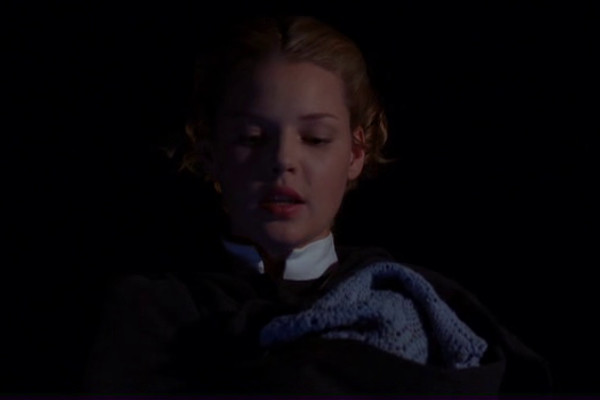
An episode that takes the sci-fi cliche of "what if you could go back in time and kill Hitler as a baby?" and runs with it in all its bad taste glory. There are so many levels on which this episode offends it's almost impossible to list them all, though the final twist of "Hitler was really a gypsy, after the Hitlers' real baby was drowned" has to rank highly among them. Forest Whitaker even has a wry smile in his introduction, almost as if he's presaging a popcorn chomper, rather than 22 minutes of a woman attempting to murder an infant.
Speaking of Whitaker, then perhaps the oddest part of his introductions is that he's grafted into the shots in the same environment with the characters, not as if he's just in the same location, as with Rod Serling, but as if he's actually in areas where they should be able to see and hear him. This is especially odd here, where Hitler's father has spent the runtime ranting about the need for perfection and Aryan purity... yet doesn't complain to anyone when a black guy with a droopy eyelid suddenly appears in the middle of his living room.
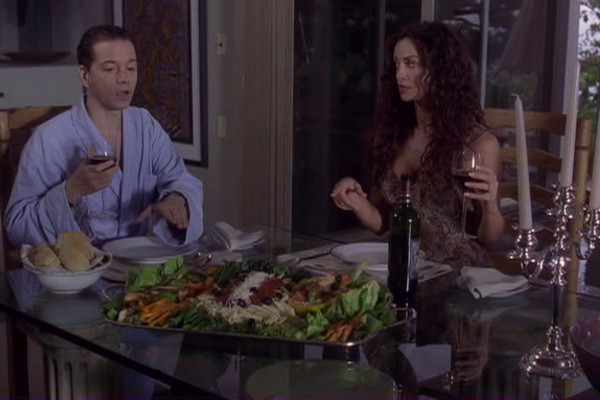
Frank Whaley ("Brett" from Pulp Fiction) stars as a man in a dead-end job who gets to trade his own life for riches, a large house and a beautiful wife. That all doesn't work out as he desired largely goes without saying in this predictable and flat episode.
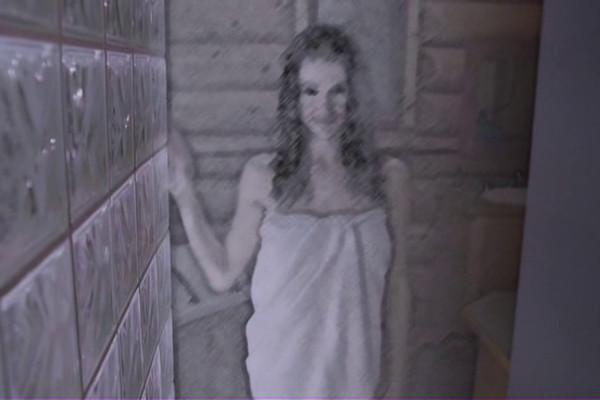
As the incidental music composer, then Mark Snow's work is proficient, but an awkward choice. Most well known for his work on The X-Files, the sounds he produces for this series are frequently indistinguishable from X-Files music, and thus fail to give the programme its own identity. Perhaps even more galling, Snow feels the need to allude to or even directly include the famous "doo-doo, doo-doo" Twilight Zone motif in a huge number of the episodes, this one included, which does become an affectation too far.
This episode sees Adrian Pasdar (Nathan Petrelli from Heroes) as a graphic novel artist searching for inspiration, until his muse - in the form of a Shannon Elizabeth - comes to life from his imagination. Despite a decent twist ending, this episode is every bit as inane as it sounds.
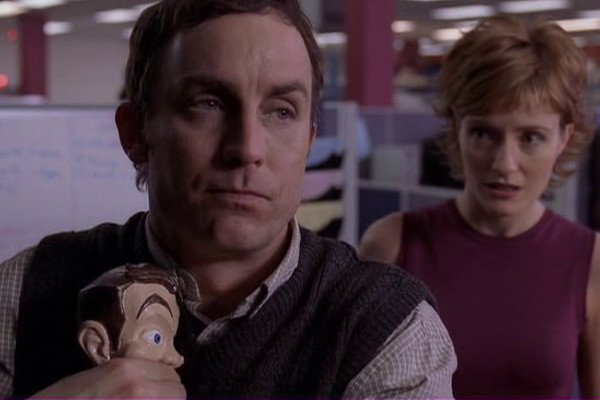
A "comedy" episode, and Mark Snow's jaunty incidental music unfortunately never lets the viewer forget it. Wallace Langham plays Charlie Stickney, a downtrodden office worker bullied by his domineering boss, who gives him a talking "Mr. Motivation" doll as a birthday present. Langham is fine, and harkens back to the earlier meek men of the 60s show, but all around him are encouraged to give broad performances that corrode any sense of realism.
This is not to suggest an episode about a talking motivational doll should be regarded as the most serious instalment, but that the humour doesn't arise naturally from the situation, being forced and overbearing. And, despite the show's grounding in a bygone era, it's updated with content that never would have made the 60s show, particularly the boss calling Charlie a "pussy" and kicking him in the genitals.
Whitaker's ability to interact with the environment without being seen reaches new lows when Charlie throws away a cupcake... only for it to land in the wastebin that Forrest is holding. Later, Whitaker presses down on "Mr. Motivation" (Pat O'Brien) in order for him to give the sign off of "... The Twilight Zone."
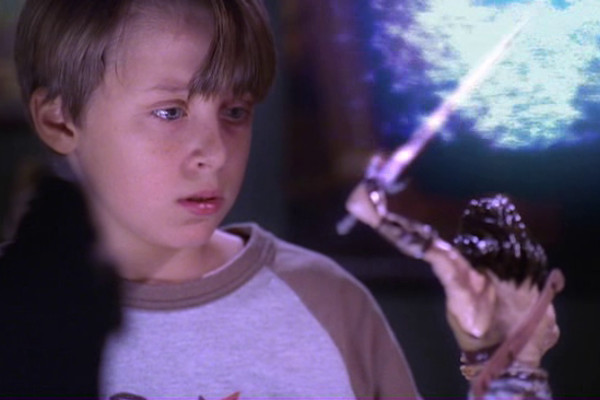
Macaulay Culkin's younger brother Rory stars as a child who brings one of his action figure heroes to life - Azoth, a kind of proto-Conan. The original Twilight Zone flirted with fantasy, but the comeback series have used it far more regularly, changing the series from a sci-fi/supernatural series into more of a catch-all fantasy show. This instalment is likeable enough, to a point, but contains mixed messages, with the youngster making his own father vanish into thin air at the climax. It's a muddled resolution, but then an episode that tries to put comic book heroes coming to life into a narrative about a man beating his wife was always going to seem disjointed.

In reviewing this season, there's a perhaps unfair tendency to compare and contrast it with the original series. It's difficult, because while it should be taken on its own terms, it does share the name of the 1950s/60s show, and so is effectively attempting to ride on its coattails. Perhaps the biggest difference is the target audience. Serling loved to fill his episodes full of men in their "30s" who looked about 50. Whereas a great number of the UPN episodes are peopled by teens, seemingly in an attempt to attract a more demographic-friendly audience. The upshot is that, rather than a literate and insightful science fiction drama, many of them replicate the experience of watching cheap teen horror flicks, the dial permanently set to "Final Destination".
This story features Amber Tamblyn as a troubled teen, who is moved with her family to the town of "Evergreen", where teens who break the rules are eventually murdered. It's questionable how such a plot qualifies as a Twilight Zone, but even more questionable is the running order of this instalment. Produced sixth, it was eventually dragged forward in the screening order, packaged with third-produced story One Night at Mercy to make the first episode. Quite how the producers thought this weak story was going to hook audiences for the new revival is something to wonder, and, certainly, when the show was screened on the BBC back in 2003, I showed my personal appreciation by hitting the off switch.
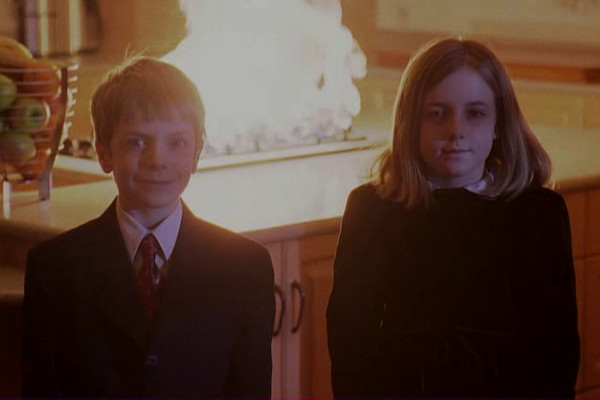
The final story of the season, whereby Jason Bateman plays a businessman who organised an apartment fire for insurance purposes... only for two children to be trapped inside. The two children come back as ghosts to enact their revenge, plotting to kill all those involved in the arson attack. Most of the people who worked on the series had prior experience in the medium, often with similar genre shows like the 90s version of The Outer Limits. However, the two writers here - Seth Weisburst and Daniel Wolowicz - have no other credits to their name. It's a shame because, while there's nothing particularly special or original about this episode, it's serviceable TV, and one of the better efforts from the UPN series.
One curious element of the show is that Whitaker's traditional introduction of "... the Twilight Zone" doesn't always immediately bring in the opening credits like you'd expect. Here, in the longest pre-credits sequence, lasting nearly six minutes, Forrest appears 2'30m in, cueing the story, only for it to run on for another three minutes before the opening titles kick in.

One cult series that's a regular connection with this version of The Twilight Zone is Star Trek: Deep Space Nine. One of the two producers, Ira Steven Behr, had acted in some production capacity (from supervising to executive) on all but one episode of DS9. The series was a great favourite here at the Zone, so it's perhaps a shame the quality of that show didn't really cross over to this update of TZ, but, perhaps quite naturally, a number of writers/directors/actors from DS9 appear in it.
The lead actress in this episode, Susanna Thompson, had appeared in the fourth season episode Rejoined and, perhaps most significantly, the writer, Robert Hewitt Wolfe, had written 27 DS9 episodes, and provided the story to 5 more. Of the UPN Twilight Zone's 15 writers, a third of them had writing experience on the show. This is not to suggest that there was any special "network" of creative personnel, more that people who had previously worked together were aware of each other's strengths and abilities at getting a series made... in contrast, only a third of the show's dozen directors had worked on Deep Space Nine.
An odd choice of the series is that many episodes begin almost "mid sentence", with characters already talking and no establishing shots beforehand, almost like the viewer is eavesdropping on a private conversation. It happens here, and, as it flouts standard TV convention, it does feel contrived, even if only on an unconscious level. With a character in the middle of passing an object to another as the opening shot, it looks artificial, and so the viewer is taken out of the artifice, and is forced to work at re-engaging with the unrealness of the drama.
It's one of just many small yet significant elements that makes a great chunk of these episodes seem stagy. Most of them are competently acted, directed and written, but when all the various elements are placed together, there's something almost inexplicable that makes a lot of them appear to be somewhat cheesy and overacted, even if they're actually not. Produced by industry professionals, there's nevertheless a "Hallmark Channel"/"TV movie" feel to a great deal of the output here, this episode included.
It's a shame, because as a psychological drama, a woman finding her family being replaced and no one seeming to notice is one full of potential. Although "wish" stories are a little too fantastical, even for The Twilight Zone (the classic The Big Tall Wish excepted), this one does get off to a reasonable start as a mother wishes her dog and kids were more perfect, leading to them being replaced.
There's an element of poignancy at the climax, where Forest Whitaker - presumably green screened into all of the episodes, but never more crudely than here - reflects on what it would be like to be replaced by someone more perfect. Whitaker's a fine actor, but the scripts never seem catered for him, and, while perhaps not miscast, because he's delivering Serlingesque dialogue, he appears to be. Ultimately there's a certain irony in an episode where people wish that things could be better. In another life, viewers were given a first-rate reimagining of The Twilight Zone... sadly, for viewers in this reality, the series was, at best, just over passable entertainment.